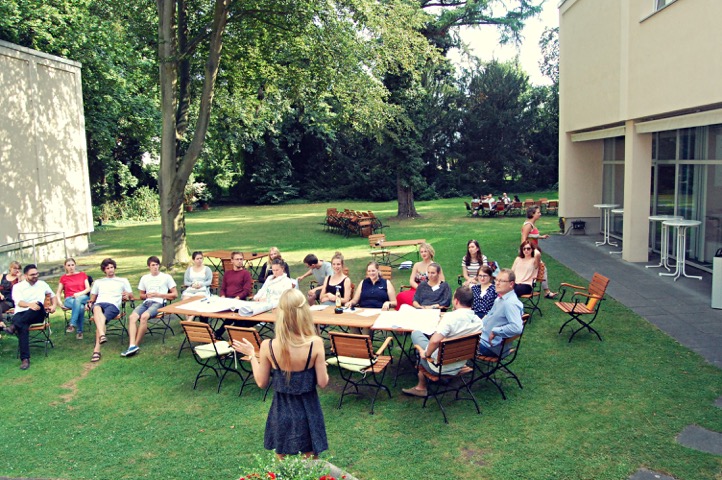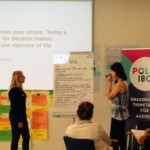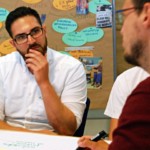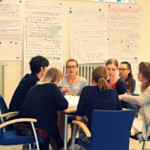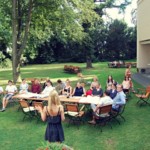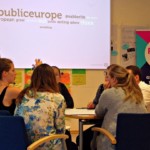Polis180 Goes Summer School: ‚Let’s Talk! Czech-German-Polis Impulses for a Better Communication in Europe‘ at EAB Berlin, 30 July 2016
On 30 July 2016, Polis180 organised one day of workshops in the framework of the ‘enter:trust’ summer school, which was organised by the European Academy Berlin e.V. in cooperation with the Polish Robert Schuman Foundation and the Czech organisation Kuro Hrade Králové for Culture and Volunteering. This one-week summer school aimed at fostering a culture of debate and constructive critique, at raising the understanding for each other’s different approaches and at rebuilding trust in European cooperation.
Dr. Weronika Priesmeyer-Tkocz, programme director at the European Academy Berlin e.V: “The workshop with the grassroots think tank Polis180 gave the participants of ‘enter:trust’ the opportunity to sum up the results of the previous seminar days and to give them another possibility to think out of the box. The workshop was outlined so as to not only debate from a Czech, German or Polish perspective, but from the perspective of a truly European young generation – which also will be responsible for Europe’s future.”
Context: The idea behind ‘enter:trust‘
During this week of seminars, the participants discussed and analysed German-Polish-Czech relationships and current European challenges. The different seminar formats, including workshops and group discussion as well as innovative debating methods created an interactive and participative atmosphere.
Dr. Weronika Priesmeyer-Tkocz, programme director at the European Academy Berlin e.V. on the idea behind ‘enter:trust’: “At the European Academy, we regularly organise bilateral seminars, both German-Polish as well as German-Czech ones on current European topics, current challenges and possibilities of cooperation. However, we noticed that a trilateral perspective was missing: how are we as neighbours in central Europe thinking about questions of European integration and current challenges of the EU, as for example migration and asylum policy, security, energy, but also populism? As a consequence, the idea of ‘enter:trust’ was born. It aims at giving the younger generation an opportunity to discuss current European developments and exchange views with each other within a trinational context. The focus here is to deal with different issues in a discursive way.”
Magdalena Stawiana, seminar coordinator at the European Academy Berlin e.V. also underlined the importance of formats such as ‘enter:trust’ in order to make the voice of the younger generation heard: “I constantly get reminded that the ideas of the younger generation must not be underestimated. Young people have many valuable ideas. They want to get involved and they seek the exchange with each other at international level. They discuss in a constructive yet critical way, and it is important for them to have a platform to present their ideas. (…) I hope that the participants will go home with the idea that ‘our’ Europe is something which connects us now and in the future.”
Workshops with Polis180: The European public sphere from different perspectives
During a one-day event, cut down in 3 workshops facilitated by the team of Polis180, a group of 20 master and PhD students from Germany, Poland and the Czech Republic discussed challenges, utopias and policy recommendations towards a European public sphere. The chosen ‘future lab’ format helped the participants to commonly reflect on the concept of a European public sphere and to discuss press freedom and freedom of expression.
In four workshop groups, the participants focussed on one stakeholder and its behaviour towards the European public sphere respectively: the European as well as the national level, civil society and the media. The participants debated and analysed problems, challenges and obstacles potentially impeding the creation of a European public sphere. As a result of this exchange, they developed policy recommendations for their respective stakeholder and identified different options to take action in order to promote and support the creation of a European public sphere.
In Depth: The Ideas Behind Polis180’s Workshops
The following abstract presents an overview of the process and findings accomplished by the experts during this workshop:
Phase 1: What are the problems?
In the first phase of the future lab, participants identified the problems and challenges of a European public sphere, asking themselves what actions their respective stakeholder took in favour of or against a European public sphere.
For instance, the young experts noted during their discussions the difficulty of the European Union to create a direct connection to the personal life of its citizens, who in return do not identify with the EU. There is therefore no cross-national public debate; complex policy issues are predominantly seen through a national lense. Participants further asserted that when the EU makes headlines, it is mostly negative news. Additionally, they determined national politicians to play a crucial role in fostering thinking in ‘national boxes’, often using a lack of EU knowledge of their own citizens as well as the prominent absence of EU representation in the media to play the ‘EU blame game’. In addition, the media was identified not only as an essential element of a European public sphere but also as an ‘opinion-maker’, meaning that it gives citizens a voice, reflects local opinions and gives space to experts. However, as the participants noted, the media suffers from a lack of funding and citizens face an overload of information through different channels.
Finally, the last point discussed was that civil societies in Europe are missing a blueprint of how to establish participation in the context of European integration. Civil involvement and activism have been limited, mostly due to language issues. In addition, citizens tend to have passive attitudes and a lack of interest in European issues. Participants observed a vicious cycle between inhibiting factors, such as poor language education, and a lack of participation that prevents actors in civil society from having a more substantial impact.
Phase 2: In a perfect world…
After gaining insights into the current obstacles of a European public sphere, the participants were asked to design a vision of a ‘perfect’ European public sphere – a European utopian construct. During this second phase, they defined the ideal behaviour of their respective stakeholder towards a European public sphere, including motivations, policy instruments and tools. Participants were explicitly encouraged to think out of the box and hence, sometimes, truly ‘utopian’.
Broadly speaking, participants focused on awareness, interest and knowledge of Europe, and specifically European politics.
Objective information transmission was identified as a key prerequisite to a ‘utopian’ European public sphere. One group envisioned the EU as an easily accessible ‘customer service’, directly informing its citizens. Practically, a European newspaper could be shipped to the citizens’ post boxes for free. Others highlighted the responsibility of national politicians to inform their voters objectively about decisions taken at European summits. In addition, the public debate would encompass a greater European rather than a national perspective. This would require increased interest for and therefore deeper knowledge of the EU by its citizens. To provide that knowledge, participants thought different media actors to support and nourish a broad public debate with a strong focus on the EU through a European perspective.
Part 3: Policy recommendations
In the final phase of the workshop, the participants were asked to formulate specific policy recommendations for their respective stakeholder.
In this phase, participants underlined the role of national and European politicians to highlight the political variety at the European level and to better cooperate together. The participants recommended to set up common candidates for European elections to be selected directly via a ‘second list’ across all Member States. If these nominations were transparent and competitive, they could tackle the EU’s often-debated democratic deficit and ensure that candidates are elected according to merit and expertise.
Participants also noted that the administrative capacities of small Member States risk to be overburdened by European topics. Therefore, Member States could create administrative ‘task forces’ to help out those Member States which requested it. Such administrative exchanges would improve the mutual understanding and examples of best practice would be shared between national or even regional administrations.
Thirdly, participants clearly put an emphasis on education. They suggested to further integrate topics such as the political system of the EU and other European issues into school curricula. Moreover, the majority of participants endorsed an expansion of programmes such as Erasmus, for instance starting at a high school level to reach more people.
As to the media, it was recognised as an essential factor for a European public sphere. The setting-up of more intra-European media could be supported and a European media network could ‘translate’ between national and European editorial teams, diversify perspectives and broaden journalists’ networks.
Conclusion
Overall, this future lab and its three workshops were the source for insightful, fruitful and comprehensive discussions on various aspects of the European public sphere. On the one hand, participants came up with ideas on how to tackle the obstacles remaining in the way of a European public sphere. On the other hand, they also formulated precise policy recommendations for the different stakeholders engaged in this sphere.
All in all, the workshop underlined the communication deficit between the EU and its citizens. Also, it emphasised the need for more education about European issues and better information on a daily basis.
Bilder von den Workshops
Projektverantwortliche
Sylvia Schmidt
Sylvia Schmidt hat Europastudien in Berlin, Paris, Magdeburg und Prag studiert. Sie arbeitet bei der Bertelsmann-Stiftung an europapolitischen Fragestellungen. Sie hat Praktika im Auswärtigen Amt sowie im Bundestag absolviert und war als Journalistin für den öffentlich-rechtlichen Rundfunk tätig. Bei Polis180 ist sie Projektleiterin für EU-Außenpolitik.
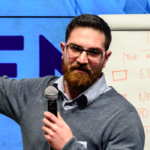
Marcel Hadeed
Marcel Hadeed ist seit Februar 2016 bei Polis180 und Co-Leiter des EU-Programms. Zurzeit absolviert er seinen Master in Public Policy an der Hertie School of Governance. Durch seine Tätigkeit im europapolitischen Referat des Bundesministeriums für Arbeit und Soziales setzt er sich intensiv mit der Weiterentwicklung der europäischen Arbeitsmarkt- und Sozialpolitik auseinander. Darüber hinaus interessiert er sich besonders die institutionelle Weiterentwicklung der EU. Sein Bachelorstudium der internationalen Beziehungen absolvierte er in Groningen und Salamanca.
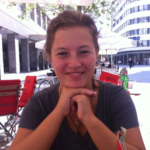
Judith Langowski
Als Deutsch-Ungarin hat Judith Langowski einen Master an der Central European University in Budapest absolviert. Seitdem schreibt sie für das unabhängige politische Magazin Kettös Mérce. Im Oktober 2016 organisierte sie mit Polis eine Veranstaltung zu regierungskritischen Medien in Polen und Ungarn. Sie interessiert sich für die Vernetzung unabhängiger, junger Medien in Europa und hat im Rahmen des Projekts „enter:trust“ den Workshop zu Medien in Europa geleitet.
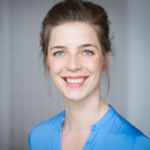
Marlen Richter
Nach einem Master in European Studies an der Europa-Universität Viadrina in Frankfurt (Oder) hat Marlen Richter bei einer politischen Planspielagentur in Berlin gearbeitet. Nach Stationen in Frankreich und Spanien hat sie erste Berufserfahrung beim Bundesministerium für Bildung und Forschung und im Deutschen Bundestag gesammelt. Bei Polis 180 ist sie im Programm EU aktiv.
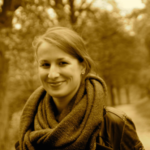
Julia Scharmann
Julia Scharmann arbeitet als Referentin bei der Friedrich-Naumann-Stiftung für die Freiheit. Dort ist sie im Bereich Internationale Politik für die Region Südost- und Osteuropa zuständig. Zuvor hat sie European Affairs und Global Studies studiert, mit Stationen in Tschechien und Dänemark.
